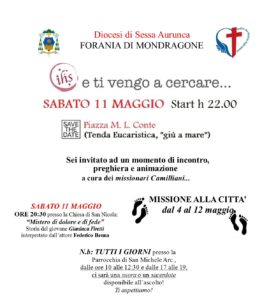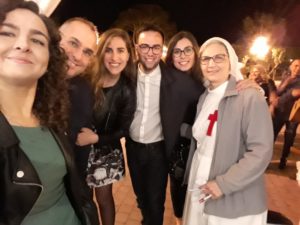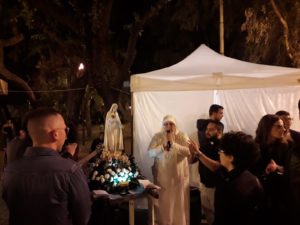 Reflections on the recent Camillian Parish Mission in Mondragone (Caserta)
Reflections on the recent Camillian Parish Mission in Mondragone (Caserta)
By Luca Caiazzo, a young man and local journalist
In Mondragone young people of the parishes and Camillian missionaries immersed amongst the young: the ‘outward-going Church’ mission.
11 May 2019 22.00 SAVE THE DATE’: a leaflet in a style for young people had been circulating amongst young people who frequented the nightlife of Mondragone. It had logos that evoked the invitations to evenings of music in bars, from the town villa to the pier and on to a part of the waterfront. It had been circulating for a week, almost without provoking a reaction, because in its title there were symbols that refer to ‘other entities’, things called a ‘vicariate’ or a ‘diocese’. To sum up: things to do with the Church. But there are sentences that at a certain moment and in certain places can become sharp blades. The title of a song by Battiato suggests this: ‘and I am coming to look for you’. The idea of parish priests and of the vicar of the vicariate, Don Nando Iannotta, in this initiative young people of the parishes, helped by the presence of Camillian missionaries involved in Mondragone in an inter-parish mission for the sick and the infirm, went for a week to distribute leaflets and then, strongly equipped with a monstrance and a statue of the Virgin Mary, stood in a gazebo/tent with the stimulating provocation: ‘Jesus is here; he is looking for you; he wants to talk to you; he is really listening to you!’
This was in fact an alien presence, hosted in virtue of a wish to live the city, in a place that is known for music that challenges the tolerance of the ear, that should be a ‘light’ evening or something more of the character of a disco, a place where young people and very many teenagers meet, as well as a few parents who watch over their children who escape to bars in search of entertainment, of distraction, and above all of entertainment that sates the evening…to then return again with the same company, with others…with a girlfriend or whoever it may be.
But with Don Nando young people, helped by Fr. Alfredo M. Tortorella, a missionary of St. Camillus, and by very many women religious…armed with guitars, involved by seminarians and many animators, challenged themselves: they invited young people to enter the tent of the Eucharist, they impressed them with the offer of a different, interior, dialogue…which shook the mediocrity of empty trips down there to the sea, to drink to the point of not remembering the conversations of the previous evening, the friends that were seen and the things that were said. The young people of the parishes had become missionaries, in the style that Pope Francis gives to us in Evangelii gaudium: drawing near to transmit and to attract without engaging in proselytism but bearing witness to the fact that Jesus is alive and calls those who follow him to full life. Reference was made to an ‘interior search’, to ‘divine mechanics’, but also to openness, to the fight against dogmas, to words that say to the most sceptical: “who are you to look for me this evening?” An evening that began in diffidence but which was transmuted into street evangelisation: it brought  together about a hundred young people, of different age bands…practising and non-practising Christians, believers and non-believers, some who even drew near while they were drinking…others who were simply curious, in couples, in groups…others who were alone. All in a queue to go into the tent, allowing themselves to be looked at by that Holy Host, albeit without understanding much; leaving an intention, a prayer, a request, or collecting a small sheet of paper with a word from the Bible, which, for those who wanted it, was broadened into a deeper talk with the priests who were present or the sisters. Then the amazement: many asked for confession; they separated from their previous programme for Saturday evening and immersed themselves in a dialogue with a priest who listened to their confession and absolved their sins. A group of young people who were looking for that new, intimate and singular encounter, speaking to a priest in a cassock at the little wall ‘down by the sea’.
together about a hundred young people, of different age bands…practising and non-practising Christians, believers and non-believers, some who even drew near while they were drinking…others who were simply curious, in couples, in groups…others who were alone. All in a queue to go into the tent, allowing themselves to be looked at by that Holy Host, albeit without understanding much; leaving an intention, a prayer, a request, or collecting a small sheet of paper with a word from the Bible, which, for those who wanted it, was broadened into a deeper talk with the priests who were present or the sisters. Then the amazement: many asked for confession; they separated from their previous programme for Saturday evening and immersed themselves in a dialogue with a priest who listened to their confession and absolved their sins. A group of young people who were looking for that new, intimate and singular encounter, speaking to a priest in a cassock at the little wall ‘down by the sea’.
For the Camillian Father Alfredo Maria Tortorella, ‘the inter-parish Mission was fruitful for the Camillian community (Ministers of the Sick and Daughters of St. Camillus), a unique opportunity not only for its principal target, the sick, but also for families and young people, all those who provide pastoral care and ministers of communion. That evening of evangelisation as well, in the style specific to St. Camillus, we bent over the wounds of people’s bodies and spirits, so that those who felt distant from the Church would feel touched when it came to their need for inner healing. The message of mercy was now entrusted to the parishes, bringing the Gospel to those who suffered in body and spirit. An expression of gratitude to Bishop Msgr. Orazio Francesco Piazza who blessed the mission, to the parish priests of the communities that were visited, Don Nando and Don Paolo, and Don Osvaldo, who in the autumn will host us in his parish’.
The notes of the great journey made by a spiritual research have acquired greater, indeed unexpected, strength. And as spectators of this event, as people involved in the invitation to attract people to God, we can say that the greatest emotion came when we saw those moved faces which, after coming out of the tent, gave thanks for that moment that had been so intense, unexpected and looked for.
 The Church through these gestures demonstrates that she knows how to understand some of the feelings that stir in the world of young people, and that includes young people outside the narrow confines of the Catholic world. There is no point in adding that the context of post-modernity in which we move is gravid with challenges and questions for faith as regards meaning. Sociological Christianity has faded just about everywhere in our country as well. But the proposal made today is a demanding proposal that demands trust in our hearts and minds so as not to be gripped by a sterile pessimism. It requires the outlook of those who recognise that in the deserts of society there are many signs of a ‘thirst for God’, in relation to which there is a need for people of hope, people who are ‘living sources of water from which others can drink’ (EG, n. 86). It demands above all a ‘renewal of the Church that cannot be postponed’ that operates through awareness of the identity and the mission of a lay person in the Church: ‘to go forth from our own comfort zone in order to reach all the “peripheries” in need of the light of the Gospel’ (EG, n. 20).
The Church through these gestures demonstrates that she knows how to understand some of the feelings that stir in the world of young people, and that includes young people outside the narrow confines of the Catholic world. There is no point in adding that the context of post-modernity in which we move is gravid with challenges and questions for faith as regards meaning. Sociological Christianity has faded just about everywhere in our country as well. But the proposal made today is a demanding proposal that demands trust in our hearts and minds so as not to be gripped by a sterile pessimism. It requires the outlook of those who recognise that in the deserts of society there are many signs of a ‘thirst for God’, in relation to which there is a need for people of hope, people who are ‘living sources of water from which others can drink’ (EG, n. 86). It demands above all a ‘renewal of the Church that cannot be postponed’ that operates through awareness of the identity and the mission of a lay person in the Church: ‘to go forth from our own comfort zone in order to reach all the “peripheries” in need of the light of the Gospel’ (EG, n. 20).
Thus moving with young people from pastoral care that involves mere conservation to a more missionary form of pastoral care: embodying this profound experience of the joy of the Gospel that nobody can keep to themselves – ‘Mission is at once a passion for Jesus and a passion for his people’ (EG, n. 268).














Camillians on Facebook
Camillians on Twitter
Camillians on Instagram